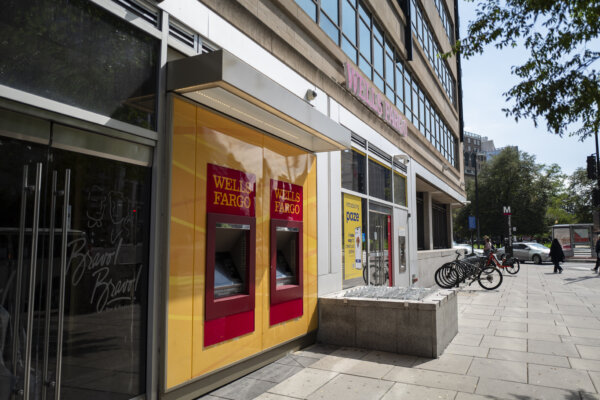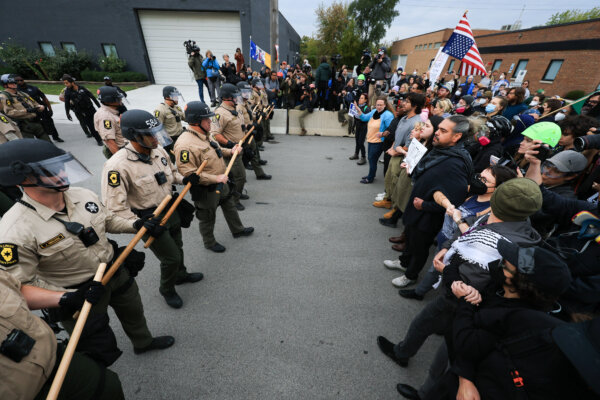![]() A senior executive of Wells Fargo, a U.S. citizen, has been banned from leaving China, renewing concerns over doing business in the communist state.
A senior executive of Wells Fargo, a U.S. citizen, has been banned from leaving China, renewing concerns over doing business in the communist state.
Analysts said that amid continued tensions between China and the United States and the Chinese Communist Party’s (CCP) intensified internal conflicts, safety risks faced by foreign businessmen in China are rising sharply.
U.S.-based Chenyue Mao, head of Wells Fargo’s international factoring business, has been banned from leaving China after entering the country in recent weeks. Mao was born in Shanghai and now lives in Atlanta. The U.S. banking giant has reportedly suspended all travel to China after the incident.
“We are closely tracking this situation and working through the appropriate channels so our employee can return to the United States as soon as possible,” Wells Fargo said in a statement on July 17.
A spokesperson for the U.S. embassy in Beijing said, “We have raised our concern with Chinese authorities about the impact arbitrary exit bans on U.S. citizens have on our bilateral relations and urged them to immediately allow impacted U.S. citizens to return home.”
The embassy would not comment on the specifics of the case.
China often detains people on charges of espionage and economic crimes, “but the charges often lack transparency or evidence, and are more for diplomatic leverage,” Yeh Yao-Yuan, professor of political science and international studies at the University of St. Thomas, told The Epoch Times on July 18. “Hostage diplomacy” has become a common practice of the CCP, he said.
String of Similar Incidents
Mao’s case is the latest in several incidents of foreign businessmen being banned from leaving China or detained.
On July 16, a Beijing court sentenced a Japanese employee of Astellas Pharma to 3 1/2 years in prison for espionage.
Authorities raided U.S. firm Mintz Group’s Beijing office in March 2023, detained its employees, and fined the company $1.5 million. The employees were released in March after two years in detention.
Leon Wang, president of AstraZeneca China, has been detained and investigated since December 2024 by the Chinese regime, and little information has been given about the investigation.
At the end of 2023, Charles Wang Zhonghe, a senior banker at Japan’s Nomura Holdings, was banned from leaving China during his visit.
 Passengers are seen at the Beijing Daxing International Airport in China’s capital city on April 28, 2023, ahead of the Labour Day holiday, which starts on April 29. Jade Gao / AFP via Getty Images
Passengers are seen at the Beijing Daxing International Airport in China’s capital city on April 28, 2023, ahead of the Labour Day holiday, which starts on April 29. Jade Gao / AFP via Getty ImagesAccording to a survey by the European Union Chamber of Commerce in China, 9 percent of responding companies reported difficulties attracting foreign employees to work in China due to security risks and personal safety concerns.
The U.S.-China Business Council published a survey of 130 U.S. companies on July 16 that finds “fewer than half are optimistic about the future, reflecting concerns over tariffs, deflation, and policy uncertainty,” despite most of the companies making a profit in 2024.
The U.S. government issued a level 2 travel advisory for China on Nov. 27, 2024, warning that “exercise increased caution when traveling to Mainland China due to arbitrary enforcement of local laws, including in relation to exit bans.”
Shen Ming-shih, director of the Division of National Security Research at Taiwan’s Institute for National Defense and Security Research, told The Epoch Times that the Chinese economy is facing many problems now and that the regime is “very afraid of large amounts of funds flowing to other countries.”
Also, amid the intensified infighting, “the CCP’s top leaders are very corrupt and use foreign banks to launder money” or transfer money abroad, according to Shen. That’s why the Chinese regime “closely monitors if there are any CCP top leaders who deposit large amounts of money in foreign banks or if bank executives enter China to handle important matters,” he explained.











